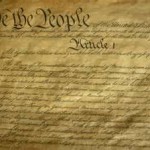Discussions of the US Constitution tend to focus upon the actions of the president, congress and the Supreme Court. While these are consequential, often overlooked is the impact of the Constitution on the actions of local government.
Most Americans are aware of the presidential oath of office required of a new president before he begins his service, from Article II, Section I, clause 8:
“Before he enter on the Execution of his Office, he shall take the following Oath or Affirmation:— ‘I do solemnly swear (or affirm) that I will faithfully execute the Office of President of the United States, and will to the best of my Ability, preserve, protect and defend the Constitution of the United States.’”
Constitutional Oath Requirement for State and Local Officials
Less known is the requirement of Article VI, clause 3 that: “… all executive and judicial Officers … of the several States, shall be bound by Oath or Affirmation, to support this Constitution…”
This constitutional requirement is binding upon every government official in the United States from state governors and judges to members of city councils, police officers, firefighters or board members of mosquito abatement districts and library boards.
State Recognition of Constitutional Oath Requirement
All the states have passed laws or have state constitutional provision recognizing the US Constitution’s oath requirement for their local officials. Florida’s statutory oath requirement is an example:
“I,____ a citizen of the State of Florida and of the United States of America, and being employed by or an officer of _____and a recipient of public funds as such employee or officer, do hereby solemnly swear or affirm that I will support the Constitution of the United States and of the State of Florida.”
Florida’s oath for elected officials varies a bit and is found in the State’s Constitution Art. II, Section 5 as:
“I do solemnly swear (or affirm) that I will support, protect, and defend the Constitution and Government of the United States and of the State of Florida; that I am duly qualified to hold office under the Constitution of the State, and that I will well and faithfully perform the duties of _________”
States Organize Local Governments Under the Tenth Amendment
While the Constitution requires that states have a “Republican Form of Government”[1] the organization of local governments was not delegated to the federal government. Absent that delegation the Tenth Amendment leaves establishing local government to state authority:
“The powers not delegated to the United States by the Constitution, nor prohibited by it to the States, are reserved to the States respectively, or to the people.”
Free to organize themselves locally, the states have created various municipal sub-divisions such as counties, cities, townships, library boards, and special taxing districts. The relationship of these sub-divisions between each other and the state, and the authority each sub-division possesses are subjects of state constitutions and statutes.[2]
Though Created by States, Local Governments are Subject to US Constitution
The Constitution’s Bill of Rights and other limitations on the conduct of government were originally directed to the power of the federal government. For example, the First Amendment’s opening phrase: “Congress shall pass no law ….” clearly was directed at actions by the central government. After the Civil War, the Fourteenth Amendment changed that, with the following language directly placing limits upon the conduct of the states:
“No state shall make or enforce any law which shall abridge the privileges or immunities of citizens of the United States; nor shall any state deprive any person of life, liberty, or property, without due process of law; nor deny to any person within its jurisdiction the equal protection of the laws.”[3] (emphasis added)
Local governments exist solely because of state constitutions and laws. As a result, for purposes of the US Constitution, actions by local governments have to comply with the Constitution in the same manner as actions by a state government.
 Constitutional Impact on Local Government
Constitutional Impact on Local Government
While the states have given many local governmental bodies great authority over varying subject areas, these governments remain impacted by constitutional considerations in their conduct.
Here are a few constitutional considerations for local government conduct:
- Zoning Laws: Local governments often have authority to define different areas of their community for varying types of uses such as residential, commercial or industrial. In the course of these definitions, there are constitutional requirements to consider citizens’ rights to free speech, assembly and religion. Zoning regulations cannot operate to ban the exercise of such rights. An example of zoning that impairs constitutional rights: On January 7, 2014, US District Court Judge Edmond Chang ruled Chicago’s ordinance banning gun shops an unconstitutional violation of the Second Amendment.
- Eminent Domain: Authority may exist for a local government to acquire property for public uses, and that authority may include “taking” private property for a public purpose. A local government is bound by the Fifth Amendment‘s “takings clause” which commands: “nor shall private property be taken for public use, without just compensation.”[4]
- Law Enforcement: Most law enforcement is conducted by units of local government such as county sheriff’s departments or city police forces. The conduct of these activities are governed by provisions in the Fourth, Fifth, Sixth, and Eighth Amendments. In some instances the Fourth and Fifth Amendments impact the conduct of “code enforcement”.
- Election Law: Many local governments have the authority to draw their own election districts or decide if they are to be organized with single member districts or “at large” elections.[5] Such decisions must comply with the requirements of the 14th Amendment’s equal protection and due process clauses, and the 15th Amendment prohibition against racial discrimination in voting.
- Permits: Local governments are typically the source of permits for activities like parades, demonstrations or picnics. The issuance of permits may also have constitutional consideration arising from the First Amendment’s guarantees regarding speech, religion and assembly.
- Taxation: Many local governments are given significant taxing authority. There may be property taxes, sales taxes, use taxes, employment taxes and more. These taxes are subject to constitutional constraints as well. Taxes improperly imposed may burden religion, speech, assembly or equal protection, or violate the “takings clause”.
Constitutionally Limited Government Applies to Local Government
The federal government was created to organize a society and protect the natural rights of its citizens. To achieve those goals limits were placed upon the central government.
The US Constitution originally delegated authority to the central government and imposed limitations on the exercise of that authority. Under the American principles of federalism, the original Constitution placed few limits on the exercise of state power. Through amendment many of the Constitution’s limitations on government authority have been expanded to include limitations on the states. Local governments, as creations of the states are subject to the same limits.
The Constitution’s oath of office for local officials has grown in meaning, and it is a critical for they and their constituents to understand the constitutional principles that apply just as clearly to the holder of a city council seat as to the president of the United States. This understanding is critical to the ability to properly fulfill the oath the Constitution requires of them.
The Discussion on Constitutionally Speaking about the Constitution and Local Government
More issues and thoughts regarding the Constitution and Local Government were addressed on this edition of Constitutionally Speaking.
[1]US Constitution, Article IV, Section 4.
[2]State statutes are laws passed by the state legislatures. When a sub-division has been given authority to pass a law, these laws are known as ordinances. For more on the hierarchy of laws, see: The Web of Law…
[3]Over time, the United States Supreme Court has, through its doctrine of “incorporation” applied most of the Bill of Rights to the states, pursuant to the 14th Amendment’s command: “No state shall…”
[4]“Taking” by a government may be actions other than acquiring ownership of the property. For example it may take place through a zoning change as well, such as changing an area from commercial to residential, thus “taking” away the commercial character of land that an existing owner relied upon.
[5]“At large” elections select a representative from the municipality as a whole as opposed to from smaller sub-divisions of the county, city, town or district area.








[…] The US Constitution and Local Government […]